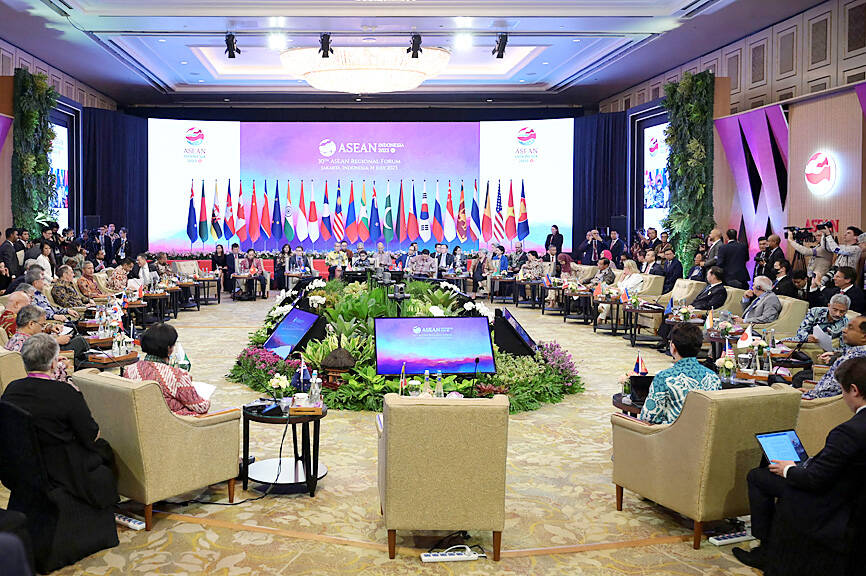The Ministry of Foreign Affairs yesterday thanked the US, the EU, Japan and South Korea for underlining the importance of peace and stability in the Taiwan Strait during the ASEAN Foreign Ministers’ Meeting and related events in Jakarta last week.
The 56th ASEAN Foreign Ministers’ Meeting, Post Ministerial Conference and other meetings were held from Tuesday to Friday.
US Secretary of State Antony Blinken repeatedly underscored the importance of maintaining peace and stability in the Taiwan Strait, including during a meeting with Chinese Central Foreign Affairs Commission Director Wang Yi (王毅) and at the US-ASEAN Foreign Ministers’ Meeting, the ministry said in a news release.

Photo: Reuters
At a news conference in Jakarta on Friday, Blinken expressed the US’ concern about China’s increasing assertiveness in the South and East China seas and in the Taiwan Strait.
The US remains committed to “upholding freedom of navigation and overflight in the South China Sea,” he said.
“The United States also seeks to maintain peace and stability in the Taiwan Strait, which is in the interest of all nations” and opposes unilateral changes to the “status quo” by either side, he added.
Japanese Minister of Foreign Affairs Yoshimasa Hayashi and South Korean Minister of Foreign Affairs Park Jin voiced concerns over the situation in the Taiwan Strait and stressed the importance of cross-strait peace and stability during their separate meetings with Wang in Jakarta, the ministry said.
EU High Representative for Foreign Affairs and Security Policy Josep Borrell on Friday wrote on Twitter that he and Wang discussed “preserving stability and the status quo in the Taiwan Strait.”
Borrell echoed a European Council report published on June 30, which said that the EU “is concerned about growing tensions in the Taiwan Strait,” the ministry said.
The concerns voiced by these leaders demonstrate that peace in the Taiwan Strait has become the consensus among like-minded countries in the Indo-Pacific region, it said.
Taiwan would continue to work with like-minded partners to deepen relations and cooperation, as well as safeguard peace, stability and prosperity in the Taiwan Strait, it added.
In other news, the ministry yesterday said that Nicaraguan President Daniel Ortega’s administration was attempting to curry favor with Beijing by planning to propose to replace the Legislative Yuan with the Chinese National People’s Congress as an observer in the Central American Parliament (PARLACEN).
In April last year, then-PARLACEN president Guillermo Daniel Ortega Reyes of Nicaragua issued a statement, which had not been discussed by the parliament, saying that there was only “one China,” the ministry said.
By planning to rescind Taiwan’s observer status, Nicaragua was again attempting to placate China in hopes of obtaining economic aid and political support to solve its domestic economic woes, the ministry said.
It said that Beijing’s use of its “one China” principle to prevent Taiwan’s participation in international organizations was disgusting behavior that lacked respect for international organization mechanisms.
The ministry called on Ortega to restore Nicaragua’s democratic constitutional system as soon as possible to win international support instead of blindly appeasing Beijing.
Additional reporting by CNA

AIR SUPPORT: The Ministry of National Defense thanked the US for the delivery, adding that it was an indicator of the White House’s commitment to the Taiwan Relations Act Deputy Minister of National Defense Po Horng-huei (柏鴻輝) and Representative to the US Alexander Yui on Friday attended a delivery ceremony for the first of Taiwan’s long-awaited 66 F-16C/D Block 70 jets at a Lockheed Martin Corp factory in Greenville, South Carolina. “We are so proud to be the global home of the F-16 and to support Taiwan’s air defense capabilities,” US Representative William Timmons wrote on X, alongside a photograph of Taiwanese and US officials at the event. The F-16C/D Block 70 jets Taiwan ordered have the same capabilities as aircraft that had been upgraded to F-16Vs. The batch of Lockheed Martin

GRIDLOCK: The National Fire Agency’s Special Search and Rescue team is on standby to travel to the countries to help out with the rescue effort A powerful earthquake rocked Myanmar and neighboring Thailand yesterday, killing at least three people in Bangkok and burying dozens when a high-rise building under construction collapsed. Footage shared on social media from Myanmar’s second-largest city showed widespread destruction, raising fears that many were trapped under the rubble or killed. The magnitude 7.7 earthquake, with an epicenter near Mandalay in Myanmar, struck at midday and was followed by a strong magnitude 6.4 aftershock. The extent of death, injury and destruction — especially in Myanmar, which is embroiled in a civil war and where information is tightly controlled at the best of times —

Taiwan was ranked the fourth-safest country in the world with a score of 82.9, trailing only Andorra, the United Arab Emirates and Qatar in Numbeo’s Safety Index by Country report. Taiwan’s score improved by 0.1 points compared with last year’s mid-year report, which had Taiwan fourth with a score of 82.8. However, both scores were lower than in last year’s first review, when Taiwan scored 83.3, and are a long way from when Taiwan was named the second-safest country in the world in 2021, scoring 84.8. Taiwan ranked higher than Singapore in ninth with a score of 77.4 and Japan in 10th with

SECURITY RISK: If there is a conflict between China and Taiwan, ‘there would likely be significant consequences to global economic and security interests,’ it said China remains the top military and cyber threat to the US and continues to make progress on capabilities to seize Taiwan, a report by US intelligence agencies said on Tuesday. The report provides an overview of the “collective insights” of top US intelligence agencies about the security threats to the US posed by foreign nations and criminal organizations. In its Annual Threat Assessment, the agencies divided threats facing the US into two broad categories, “nonstate transnational criminals and terrorists” and “major state actors,” with China, Russia, Iran and North Korea named. Of those countries, “China presents the most comprehensive and robust military threat